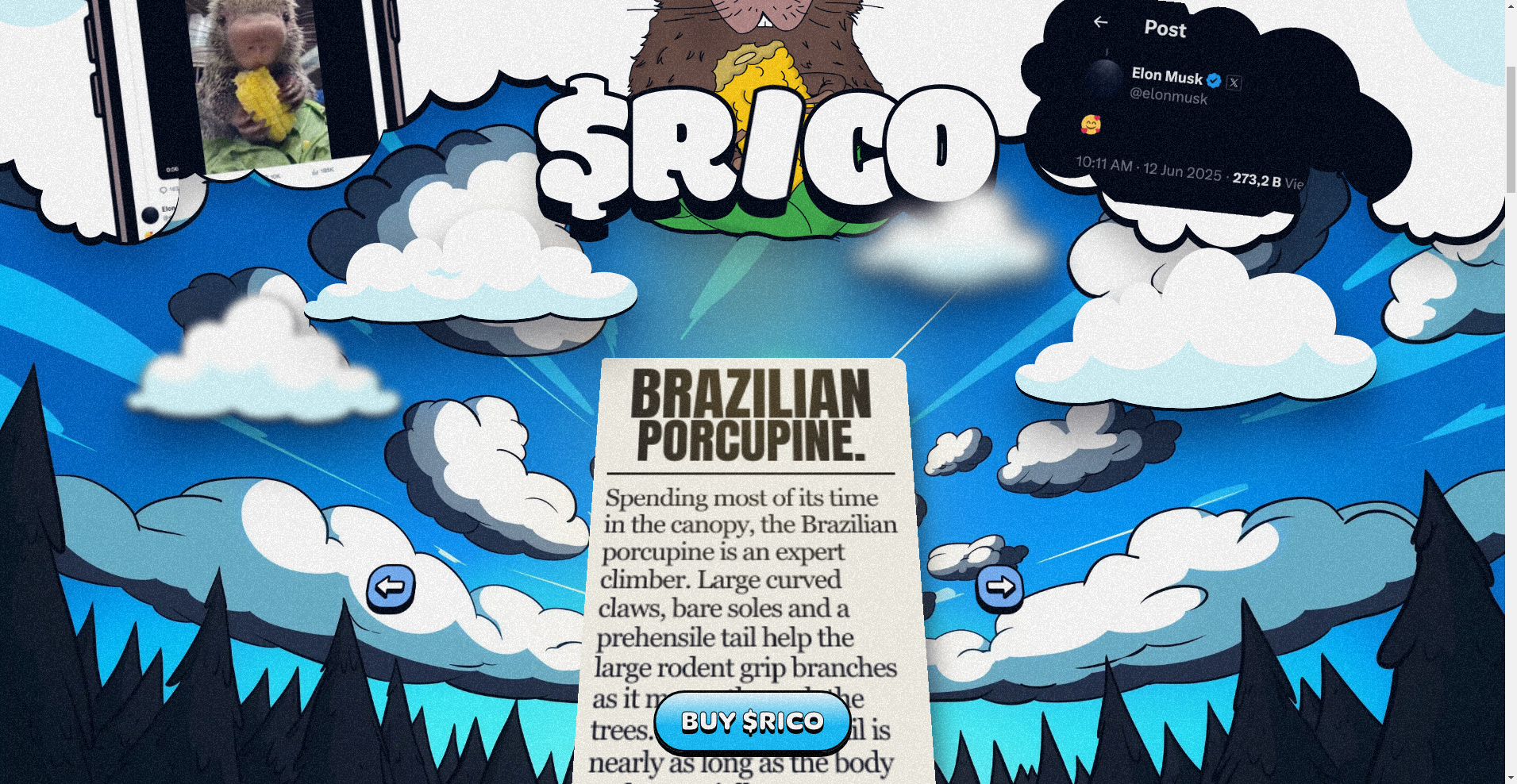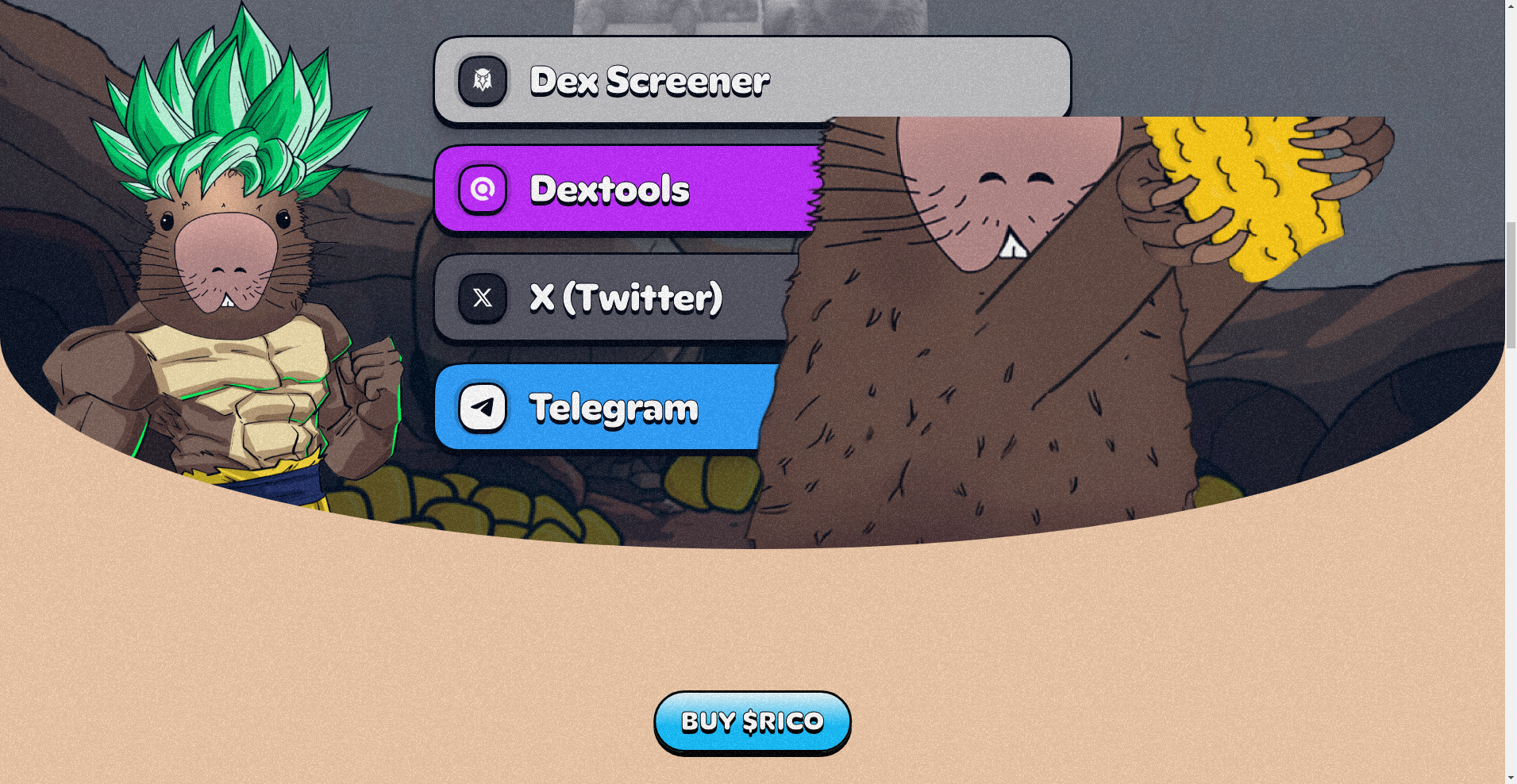In-Depth Review and Scam Check of RICO Project on Solana Blockchain

Main page of the RICO project – colorful cartoon illustration promoting a Solana-based token, providing user guides and social media links.
The RICO project, accessible via https://ricosol.net, appears to be a crypto initiative built on the Solana blockchain, issuing a total of 1 billion tokens with the notable fact that all liquidity pool (LP) tokens have been burned. This action indicates an attempt to create a scarcity-driven tokenomics model. In this review, we will analyze the core aspects of the project, assess the risks involved, transparency, community engagement, and the technical and legal risks associated with the platform.
Project Overview and Purpose

Colorful webpage header featuring cartoon style artwork, cryptocurrency trading instructions, and community links.
The RICO project is positioned as an accessible, low-to-no-tax token on the Solana blockchain, primarily targeting traders interested in quick swaps with zero transaction fees. Its main selling points include:
- Easy onboarding with detailed step-by-step instructions for buying and swapping tokens
- Emphasis on liquidity burn to prevent inflation
- Community features with active social media presence
- Standard interactive tools like Raydium for swapping SOL to $RICO
Despite its simplicity, the core strategic focus lies in creating scarcity through the LP burn mechanic, which theoretically boosts token value over time by decreasing circulating supply.
Team and Community Engagement
The project maintains a presence on:
Active communication channels and social media links suggest an effort to foster community involvement. However, there is no publicly available information about the development team, advisors, or core developers. This lack of transparency is a potential red flag, as investors typically benefit from understanding the team's credentials and track record.
Tokenomics and Supply

Illustration of a green-haired cartoon character, representing the playful style of the project and technical guide signs.
The total token supply stands at 1,000,000,000 RICO tokens, all issued on the Solana network. Noteworthy is the fact that LP tokens (liquidity pool tokens) have been burned intentionally, which reduces the available liquidity and aims to create a deflationary effect. This approach suggests the project encourages holding and minimal liquidity provision but also introduces significant investment risks related to liquidity and trading volume.
Technical and Smart Contract Risks
RICO's platform facilitates token swaps using decentralized exchanges like Raydium (at raydium.io) and the Phantom wallet for managing assets. The key points include:
- Zero tax on transactions, which minimizes immediate trading costs for users.
- Reliance on standard Solana tools and smart contracts for liquidity provisioning, swapping, and token transfers.
Potential risks involve:
- Smart contract vulnerabilities: Since the project primarily uses third-party protocols like Raydium, any bugs or exploits in these contracts could compromise user funds or disrupt trading.
- Liquidity issues: The LP tokens are burned, which reduces liquidity. Low liquidity can cause price slippage, difficulty executing large trades, and vulnerability to market manipulation.
- Token address and official contracts: Users must verify token authenticity via the official address to avoid scams. The token address derived from the site needs to be cross-verified on Solana explorers like Solscan or Solana Beach.
Roadmap and Development Activity
From the website and social channels, the project does not display a formal roadmap with specific milestones or timelines. The emphasis appears to be on community-driven growth, promotion, and token utility. Assessing recent updates or blog posts reveals limited activity; however, there are mentions of ongoing work, community engagement, and potential future features.

Overview of the website's visual style and strategic messaging, emphasizing ease of use and community engagement.
Legal and Regulatory Risks
The project claims to reserve all rights, suggesting proprietary content. However, there are no clear legal documents, terms of service, or privacy policy linked directly on the website. The absence of detailed legal documentation increases risks related to user rights, data privacy, and potential jurisdictional issues.
User Terms & Conditions and Privacy Policy are essential documents that are either missing or not easily accessible, which is concerning from a legal compliance perspective.
Recent News and Project Activity
There is sparse information about recent updates, new features, or development progress. The project seems to rely heavily on social media promotion rather than frequent development announcements. This lack of active communication and development transparency could be a sign of stagnation or lack of progress, raising additional risk factors.
Documentation and Developer Resources
For developers or technical auditors, comprehensive documentation is crucial. The project does not provide an explicit API or SDK documentation on their website, making integration or smart contract auditing difficult. The only relevant technical resource appears to be the token contract address and basic swap instructions—insufficient for developers or security analysts.
Relevant links:
Token Distribution, AirDrops, and Future Plans
Currently, there are no concrete announcements about token airdrops or future token sales. The project seems to focus on promoting the existing token and organic community growth. Any claims regarding future token distributions should be verified via official sources to avoid scams.
Summary of Risks
While RICO presents itself as a simple, low-tax, and scarcity-focused token on Solana with active community channels, several risks exist:
- Smart contract and protocol vulnerabilities: Dependence on third-party protocols like Raydium can introduce unforeseen issues.
- Liquidity risks: LP burn reduces liquidity, making large trades potentially costly and susceptible to slippage or manipulative market practices.
- Transparency concerns: Lack of detailed development, team identities, and legal documentation.
- Market risks: Limited liquidity and trading volume could lead to high volatility and price manipulation.
- Regulatory risks: Absence of legal clarity and compliance documentation.
Useful Links
Social Media
Technical and Analytical Resources
Wallets & Exchanges
In conclusion, while RICO leverages popular DeFi tools on Solana and employs mechanisms aimed at creating scarcity, potential investors should exercise caution. The platform's opacity in development, lack of formal governance or legal documentation, and liquidity constraints represent significant risks. Always verify token authenticity, avoid investing more than you're willing to lose, and consider the technological vulnerabilities inherent in smart contract-based projects.

Amanda Harris
Technical Security Educator
Security professional passionate about the "human firewall." I translate complex crypto threats into simple, actionable security habits for everyday users.
Similar Projects
-
BinoFi
BinoFi Review: Crypto Scam Check and Legitimacy Analysis
-
MeAI
MeAI Review: Scam or Legit Crypto? Scam Check & Legitimacy Analysis
-
Zen AI
In-Depth Review of Zen AI: Crypto Scam Checker & Project Analysis
-
Book Of Squid Wif Hat
Crypto Project Scam Checker Review: Is Book Of Squid Wif Hat a Scam or Legit?
-
Plutus
Comprehensive Review of Plutus DeFi Project | Crypto Scam Checker & Project Review 2024